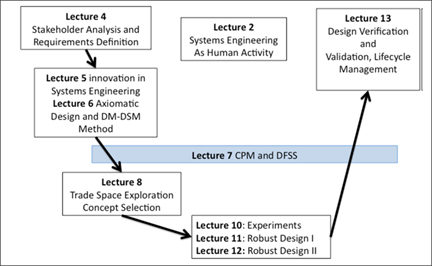Course Meeting Times
Lectures: 2 sessions / week, 2 hours / session
Course Objectives
This course intends to help you develop the capability of systems thinking by introducing classical and advanced systems engineering theory, methods, and tools. After taking this class, you should be able to:
- Develop a systems engineering plan for a realistic project.
- Judge the applicability of any proposed process, strategy, or methodology for systems engineering using the fundamental concepts from disciplines such as probability, economics, and cognitive science.
- Understand system engineers’ role and responsibilities. Understand the role of organizations.
- Apply systems engineering tools (e.g., requirements development and management, robust design, Design Structure Matrix) to realistic problems.
- Recognize the value and limitations of modeling and simulation.
- Formulate an effective plan for gathering and using data.
- Know how to proactively design for and manage system lifecycle targets.
Reading Materials
Required Textbooks
INCOSE Systems Engineering Handbook, v3.2. San Diego, CA: INCOSE, 2010.
Miller, John. QBQ! The Question Behind the Question: Practicing Personal Accountability at Work and in Life. East Rutherford, NJ: Putnam Publishing Group, 2004. ISBN: 9780399152337.
Altshuller, Genrich, Dana W. Clarke, Uri Fedozeev, and Steve Rodman. 40 Principles: TRIZ Keys to Innovation. Worcester, MA: Technical Innovation Center, Inc., 2005. ISBN: 9780964074057.
A number of technical papers will also be assigned as pre-reading for the lectures.
Overall Semester Plan

Lec #1: Course introduction
Lec #3: Student project proposal
Lec #9: Student midterm proposal
Lec #14, 15, and 17: Industry speakers
Lec #16: Student case study presentations and discussions
Lec #18, and 19: Two 4-hour final presentations
Class Sessions
An important thing about the lectures, and about the course in general, is that the lecturers will ask for your participation. For every lecture, there will be readings assigned. The readings are focused on the lecture’s theme; some were written especially for it. Please read them and come prepared to class because only then will you be able to participate in the class and benefit from what the faculty and your fellow students say.
Time Commitment and Expectations
The units on an MIT subject correspond to the time that an adequately prepared student is expected to spend in a normal week. This is divided into three numbers associated with the subject (X-Y-Z) with X being class time, Y being laboratory time, and Z being work outside of class. The numbers associated with ESD.33 are (3-0-6) making this a 9-unit subject. However, the summer term is compressed from a regular academic year term as there are 10 weeks as compared to 14 during a regular term. Thus, one must accomplish in 10 weeks what would normally be accomplished in 14 weeks. Consequently, the overall weekly time commitment is expected to be 12.6 hours. This includes 4 hours per week in class and 8.6 hours per week out of class. The out-of-class time will be spent on reading, homework, and project work.
Grading
| ACTIVITIES | PERCENTAGES |
|---|---|
| Individual project proposal | 10% |
| Mid-term project presentation | 10% |
| Final project presentation | 20% |
| Homework assignments (10% each) | 50% |
| Participation | 10% |
Homework Assignments
You will be required to complete 5 homework assignments. The theme of the assignments will be to use various systems engineering techniques to analyze the Toyota safety recall that occurred this past spring. The first four assignments are individual assignments. The fifth will be a team report and presentation. Students may form teams of five as they wish to complete the 5th homework assignment. These teams do not need to be the same as the term project team.
The manner in which you present your work can be just as important (and in some cases more so) than the overall approach manifested within the response. Be sure to clearly explain your work, the methods used, and the underlying assumptions. Such practices make it possible for us to fairly assess your work and happen also to be good practices for documenting work in industry.










